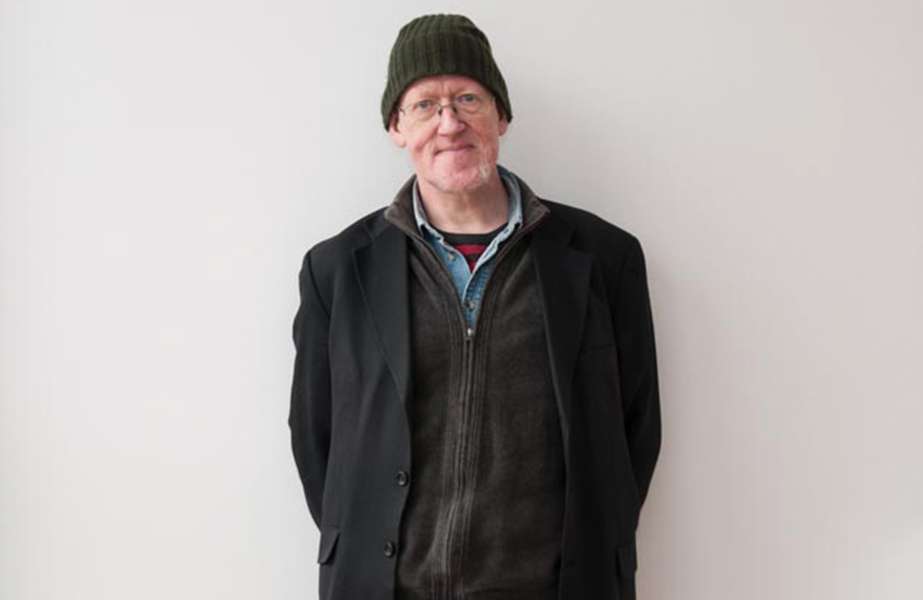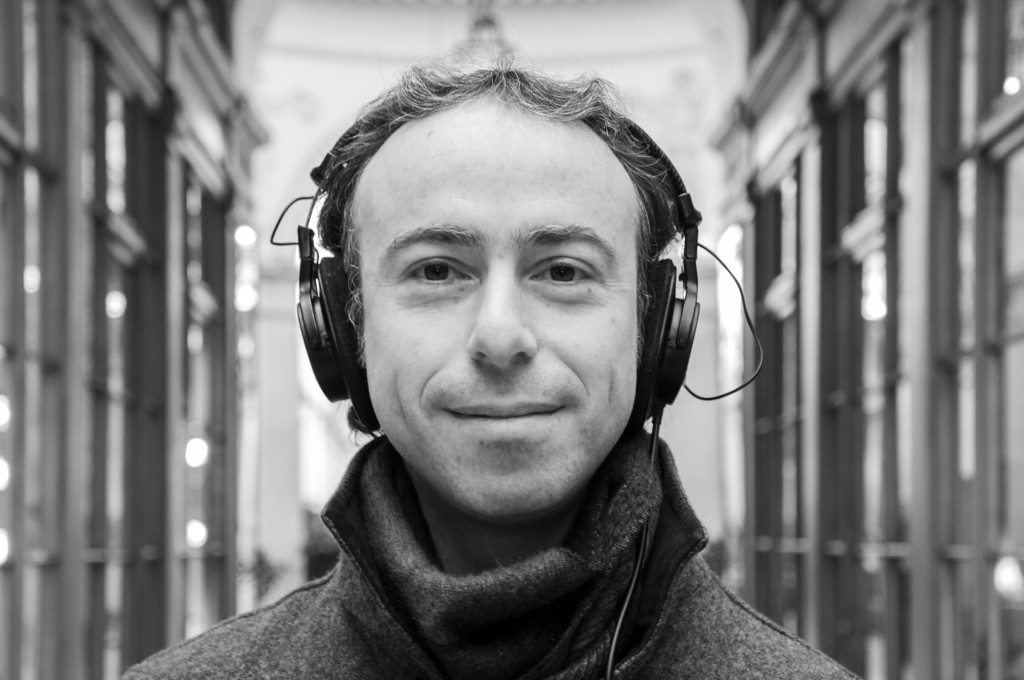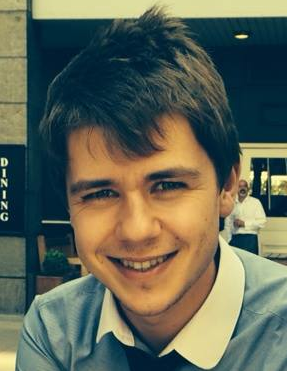The University of Huddersfield’s Edges Ensemble, directed by Philip Thomas, will perform composer Tim Parkinson’s opera time with people at this year’s City Summer Sounds festival. Tim interviewed five members from Edges in the lead-up to the performance.

How would you define yourself?
A mature student who is constantly surprised by what he is achieving and as a person who tries to define himself on a daily basis. It is sometimes hard.
I’m primarily a composer… of acoustic and electronic music. Normally it involves dots and lines, at least at some point. I don’t think I’m good enough to write text scores, for example. Even the most abstract text scores have a real precision to them… you can hide a lot of ambiguity of meaning behind a wall of notes.
An emotional music composition student, who always likes to try new things.
As a fun-loving kinda guy who likes to listen to jazz music and take long walks in the countryside on bank holiday weekends.
I am a performer & new music instigator, and more recently a researcher as well. I play new and experimental music on the violin and think a lot about tuning systems.
How does being a member of Edges relate to your life?
It started by opening my eyes to a new world of so many possibilities and hasn’t stopped. The wonderful, generous, Philip Thomas being a conduit to this new world that constantly informs they way in which I think about my work as a composer, musician, artist… I now cannot imagine a world without it!
I haven’t been a consistent member for a long time, but I’m always coming back for this or that thing. When I rehearsed with Edges often, it was a bit of a relaxing thing to do on a Friday. I wasn’t there for anyone else but me, so I left when experimental music started to take over all my headspace. I had been writing some music and essays for a module on Experimental music that year, and I just kind of overdosed on it.
I always found performing in general a bit of a chore and quite a lonely experience regardless of how many people were on stage; Edges doesn’t feel like that. It feels like a community of freely associated individuals who just happen to have found their way onto a stage and are going to do these very considered actions for the next hour or so.
How does it relate to my life? I realise I haven’t really answered the question.
Finally I have a chance to perform, which I really enjoy playing experimental pieces!
Edges is the T’ai Chi of my life. It’s a mental, emotional and occasionally physical workout I do roughly once a week. It requires deep concentration and effort, even though at times it can look pretty easy to an outsider. Just swap chi energy for wandelweiser vibes and you’re about there.
It’s one of the bands I’m in.
Where are you now as you write this? Describe what is in front of you. And what time is it?
I am in the Coffee Kabin, Huddersfield with the woman I love. This place has been the venue for so many wonderful musical performances this year it will forever be connected to really wonderful coffee and The Bacon Jam Collective of which I am a member. There is a brown leatherette sofa, some tables and a blackboard with a list of ‘AMAZING BURGERS’ on it. There is a big table right in front of me with some film studies papers on it which my partner is marking and a mobile phone a glass of lemonade and a pot of sugar. It is 16.20 on Friday afternoon and I should be in the studio. Ha! I am reminded of the author Nicholson Baker as I describe the room…
I’m at home, it’s 20 to 2 in the afternoon. Directly in front of me is a painting my dad made in the 1970s. It has a 60s feel to it. Very bright colours, and psychedelic patterns. He didn’t like it, so he gave it to me. I’m short sighted, so I can’t see it properly unless I get up close. If I get really close, I can see whole other worlds in a few inches. Maybe he doesn’t like it because he can see it all at once. It’s mysterious to me because I can’t connect the dots. I would try looking again with my glasses on, but that might spoil it.
At home on the sofa, flatmate is playing FIFA just next to me at 21:45.
I’m at home in Huddersfield, opposite the beautiful surroundings of Greenhead Park, but my room faces the other way so I can’t see it. Instead I’m looking on to a slightly unorganised desk and through a window that overlooks our neighbours garden. Occasionally I see them doing weird exercise videos or having a barbecue or hanging out their underwear. It’s Thursday 21st May at 10:27.
I’m on the train from Manchester Piccadilly to London Euston, returning home from Huddersfield. It’s a gross Virgin train, very loud in the quiet coach. My laptop is in front of me, and behind that (on the seat opposite) a heavy (and unwieldy) winter duck down duvet, which I’ve had to cart back from Huddersfield on foot, stuffed in a giant lime green M&S bag. It’s 8:15pm.
What were you doing exactly one year ago?
Almost to the day I was putting the finishing touches to my Masters Thesis… coming to the end of a frenetic but rewarding year.
Last year I was an assistant tutor at a sixth form college in Manchester, teaching A-level music and music technology. It ended up being a bit of a drag. I hardly wrote anything and I didn’t perform much.
I did get to see some of the most important people in my life much more frequently, though, as they live in Manchester. I lived in a semi in Withington, a town I’ve always had a strong connection with. It was nice to find myself in the place where the most vivid memories of my childhood are set. It hasn’t changed a lot.
I had to prepare my performance exam but I was planning my trip to Italy.
I’m going to cheat here but almost exactly one year ago – Eurovision night 2014 – I was in a cramped house in London waiting so long for my housemates to get ready for a night out that I managed to watch the entirety of Eurovision on TV. We then went out, and I was lucky enough to meet a beautiful woman that night I would continue to see for a few months afterwards until I left back for Huddersfield. So obviously it sticks in the mind.
I was in Oslo, performing a recital of solo violin music for nyMusikks Komponistgruppe (the composers’ society of nyMusikk Norway).
What is Time With People all about? What is your view from the inside out?
It is about the person within, the person with whom we rarely engage. It is about happiness and melancholy. It is about being a social animal and about being alone in the world. This is probably a common state for us all. It is a statement on the modern malaise that effects us all. It is about connections, both to our inner selves and to our past incarnations. It talks of a big picture in terms of the microcosmic – or as my dictionary puts it humankind regarded as the epitome of the universe.
As an insider it is about spending time with people who have become friends and friends who I have got to know a little better. It is also about chaos and melancholy, about searching and finding, it talks to the child within; this child is still very apparent and it sometimes gets me into trouble. Something about this work sticks to your insides and will not let go!
If you made a series of short film clips, filming normal people going about their lives… and then you took an eraser to it until all that was left were these bits of debris, fragments, dents, and impressions. These small details or traces of details, completely detached from their context – the things we don’t normally even notice.
Well I think it’s the real world – natural human movement in time and space, everyday life. No extra musical concern. Especially in movement 4 & 5 I really enjoy and I can feel myself in the reality, staying alone in this chaotic world. Also, I can just being myself, unlike other conventional performance.
I think it’s funny for a starter. But the kind of funny where it’s because it reminds you of something or someone or sometime that you don’t want to remember, and it’s a bit awkward so you start to laugh. I think Time With People is also about reclaiming music (especially classical music, and opera, and contemporary music) for everyone. You don’t particularly have to know or understand what you are doing or watching to enjoy it, and you could possibly even ruin it by trying to read too much into it. Some bits are very hard, but there aren’t really any barriers that would stop someone with no musical background participating or enjoying the piece. I don’t know, that’s just what I think. I’ve heard people say things like ‘Time With People is what music will be like after the near-extinction of the human race’ and I kind of agree, but at the same time I don’t really care. It’s just fun to be a part of.
Dancers practice an exercise called ‘witnessing’ — one dancer holds a posture while another ‘witnesses’ their form by fitting his or her own body into the negative space left by the posture. The first dancer then departs, leaving only the new posture created by the act of ‘witnessing’. Through viewing this new posture, both dancers gain better understanding of their forms.
From inside, Time With People is something like this. We witness the objects (sounds, people & circumstances) of performance. The audience witnesses us. And we also witness them.
Are you just making it up as you go along?
Yes, of course. Being a teenager, being a partner, being a parent, being an older person – who told us anything about how to contend with all of this. I have always done this until I made the decision to leave work and come to university. Probably the first thing I have ever done, consciously. It was a good thing indeed! It seems to me it goes like this, you make some stuff up then you find out that it was a good thing or a bad thing, if it is bad then you make something else up and just keep going.
If anyone got that impression, it would be a bad performance or they weren’t paying attention. Even a decision not to overthink is still a decision, and to come to that decision it has to be have been discussed or thought through. Even if I thought I could get away with it, I wouldn’t; It would be unfaithful to Tim’s intentions… and I don’t think that’s a very ethical approach to the performance of any music somebody has composed.
Yes most of it.
Time With People? No! It’s all composed! We’re just following the composer’s strict instructions! Philip Thomas told me that if we deviate even the slightest bit from the score we would be struck off from the ensemble! I’m kidding of course, there are freedoms in the piece and there are choices we have to determine ourselves. But a lot of the chorus parts have to be exactly right to fit in with the rest of the group and sound good. I wouldn’t say I was making it up as I went along. A lot of the choices we make we have to make in rehearsals and then stick to, mainly for practical reasons (what weird sounds am I going to bring with me? what clutter do I have lying around the house?) and then the piece becomes quite set by the time of the performance.
No. I like to be deliberate when performing.
What is your next performance after this?
I hope to perform at Soni[K]ab next year. Distant plans to perform with my noise duo, Tout Croche, in Montreal. But nothing fixed.
I haven’t decided yet. James Wood and I have designs on collaborating for a new record. I’ve seen him do free improvisation a number of times now, and I found it very inspiring.
I don’t have any plans after this.
A string quartet concert with the London Contemporary Orchestra Soloists at Union Chapel, 31 May, 3pm.
Is there anything else you’d like to say?
I would like the question I have proposed for my PhD to be a little more rigorous! On the 1st of June I have to hand something in that will define what I will be doing for the next few years. By saying it out loud hopefully it may help in some way! But I doubt it!
I just want to thank Tim for creating such a wonderful piece of music and Philip for inviting me to help realise it. It’s nice to have something to be doing now that all my degree work is in. I don’t like to sit still for too long. I have a tendency toward hedonism when I’m bored, and that’s fine, but not for too long.
Thanks for the opportunity 🙂
‘The performer behaves in a situation partly determined by the composer, partly by himself, partly by ambient conditions. There is an elegant consistency which allows each of these elements to manifest its own nature, without imbalance, without imposition. Ambient sound penetrates the intended, is “included” in the music. It is relevant to the situation in which the music arises/relevant to the music, which is ever situational.’ — George Brecht, cited in Word Events: Perspectives on Verbal Notation (John Lely & James Saunders, 2011)
Contributors
Stephen Harvey
John Aulich
Dorothy Lee
Anonymous
Mira Benjamin









